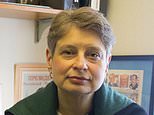Russia and the West are closer to nuclear war than they were during the Cuban Missile Crisis
Russia and the West are closer to nuclear war than they were during the Cuban Missile Crisis, warns Nikita Khrushchev’s daughter – 60 years after her father backed down from armageddon
Nina Khrushcheva’s great-grandfather was leader of the Soviet Union in 1962She said Kennedy and Khrushchev de-escalated when there was a real threatMs Khrushcheva added that it was ‘clear’ the current conflict was a proxy war
<!–
<!–
<!–<!–
<!–
(function (src, d, tag){
var s = d.createElement(tag), prev = d.getElementsByTagName(tag)[0];
s.src = src;
prev.parentNode.insertBefore(s, prev);
}(“https://www.dailymail.co.uk/static/gunther/1.17.0/async_bundle–.js”, document, “script”));
<!–
DM.loadCSS(“https://www.dailymail.co.uk/static/gunther/gunther-2159/video_bundle–.css”);
<!–
Russia and the West are closer to nuclear war than during the Cuban Missile Crisis, the great-granddaughter of Nikita Khrushchev has said.
Nina Khrushcheva, an academic whose great-grandfather was leader of the Soviet Union during the 1962 standoff, warned the conflict in Ukraine is more dangerous because neither side appears prepared to ‘back off’.
Ms Khrushcheva said despite a ‘war of words’ during the period of Cold War brinkmanship, both President John F Kennedy and Khrushchev agreed to de-escalate as soon as there was a real threat of nuclear action.
Speaking on the Today programme, she said it was ‘clear’ the current conflict was a proxy war between the West and Russia in which Ukraine is ‘to some degree a pawn’.
Former United States President John F. Kennedy (R) meets with Nikita Khrushchev (L), former chairman of the council of Ministers of the Soviet Union, at the U.S. Embassy residence in Vienna, Austria in this June 1961
Nina Khrushcheva (above), an academic whose great-grandfather was leader of the Soviet Union during the 1962 standoff, warned the conflict in Ukraine is more dangerous because neither side appears prepared to ‘back off’
Russian state TV has brazenly simulated how Vladimir Putin would launch a nuclear strike on three capital cities in Europe
Ms Khrushcheva, a professor of international affairs at The New School in New York, said of the 1962 crisis: ‘What really saved the world at the time was that both Khrushchev and Kennedy, whatever they thought of each other’s ideology and disagreed with it, and didn’t want to give in and blink first, yet when the threat appeared of a potential conflict of any kind they immediately backed off.
‘We are closer to more issues, nuclear, than any other way, because I don’t see today any side, particularly the Russian side, backing off, and that’s what really scares me the most.’
She added: ‘It was clear on February 24 it was a proxy war because it was the negotiations of Ukraine with the United States first of all and then Nato, so that was already a proxy conversation and Ukraine was to some degree a pawn in this relationship.’
Her concerns about escalation were echoed by former MI6 chief Sir Alex Younger, who said the ‘discipline of deterrence’ that helped both sides back down in 1962 appears to have been lost.
Aerial view taken in October 1962 of one of the Cuban medium-range missile bases during the Cuban Missile Crisis
Sir Alex told the programme that aggressive rhetoric from Russia was in part an attempt to ‘bully’ and ‘intimidate’ the West, but the situation should still be taken seriously.
‘I think in some ways we’ve lost the discipline of deterrence,’ he said.
‘It’s a very emotional situation that we’re in… So I think there are real dangers here, but I think Putin also is essentially trying to bully us and intimidate us with talk of his nuclear weapons.
Her concerns about escalation were echoed by former MI6 chief Sir Alex Younger (pictured), who said the ‘discipline of deterrence’ that helped both sides back down in 1962 appears to have been lost
‘He knows full well that it’s a much more complicated situation than that. Of course, the West has the capacity to retaliate and it would not in any way be a rational manoeuvre on his part to try and employ them.’
But Sir Alex rejected the argument that the war was a proxy battle, warning that such claims risk inadvertently strengthening Russia’s position.
‘The idea that this is a broader war, that we’re in a broader conflict with Russia, simply plays to the Russian narrative as they come under pressure because they’ll be able to tell their people that this is a defensive war,’ he said.
![]()


